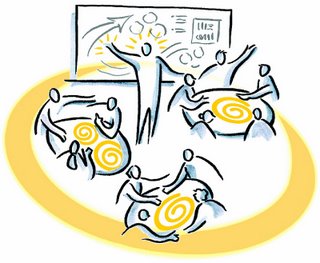- The only useful learning experiences I have ever had have been at least initially self-directed and exploratory.
- This is despite having attended educational institutions, conferences, workshops and seminars that were generally led and organized by smart, caring people.
- Because our culture is so pervasive, it’s hard to imagine a real alternative to today’s institutional educational systems, programs and processes. So it’s not surprising that most people (including most progressives) are horrified at the suggestion that our colossal investment in public and private educational institutions is almost entirely a waste of time and money. But there is substantial and growing evidence that it is.
- As Dylan Wiliam has explained (thanks to Michael Wiik for the link and precis of Dylan’s presentation), two preconditions for effective learning are (1) interesting, real challenges, and (2) a belief that this learning is urgent and important. Without them, there is no curiosity, no engagement, real attention or motivation to learn. Self-directed learning also requires (3) the capacity to take ownership of one’s own learning (which takes some effort and practice to develop), (4) a network of accessible mentors and facilitators (and of peers who can learn together from each other), including demonstrators of the learning in the real world where learners can appreciate and practice using what they’re learning, and (5) well-designed resources that provide context-rich learning content, self-assessment tools, and ideas for remedial and supplemental study.
- In undamaged (by civilization) indigenous, tribal cultures, everyone is engaged to learn, because at least the first four of the above preconditions are present for young people (and for that matter all tribe members).
- Modern educational institutions, on the other hand, generally provide none of these preconditions. The subjects we are “taught” are mostly academic, dry, and unrelated to the needs of the real world. We are taught that our role is to be consumers not providers, and that if we do as we’re told what we need will be provided to us. The capacity for independent thinking and learning is underdeveloped and even discouraged in favour of passively being “schooled”. People doing real, useful work are too busy struggling to make ends meet to afford much time to mentor or facilitate others. And what few self-assessment tools we have are “standardized”, context-poor, and designed to require us to repeat exactly the schooling that didn’t work if we “fail” to learn.
- We can’t replace our largely useless educational institutions until we live once again in a society that meets the five preconditions above. That society will eventually re-emerge after civilization’s collapse and retribalization (with the commensurate relocalization, downscaling and decomplexification of everything), but for most, effective learning will be almost impossible until then.
- This presents a particular challenge because re-learning essential skills for local self-sufficiency and community-building is paramount to creating the resilience we will need as civilization’s collapse progresses. How can we do this self-directed learning if effective self-directed learning is rendered so difficult by our civilization?
- While we’re each going to have to find the first three preconditions within ourselves (and most people who have realized the imminence and inevitability of collapse have, almost by definition, done this), there are both social and technological things we can do to establish the fourth and fifth preconditions.
- Suppose you want to learn how to fix (or even build) your own bicycle. YouTube videos can only show you how one person fixes one thing on one kind of bicycle. How might we reinvent online media in such a way that they would replicate, as closely as possible, the personal, iterative, interactive, real-time experience of taking a Bicycle Maintenance 101 course from your local bike shop?
- And how then might we supplement that reinvented online learning experience with a network of real-time mentors and facilitators you could turn to, both online and in your own community, and a network of peers learning the same competency so learners can also learn from each other?
- And then, how might we further supplement this learning experience-plus-network with self-study resources that include context-rich self-assessment, remedial and more advanced study resources?
- We learn much more by experiment, and by making mistakes, than by doing things correctly. Unless we don’t know that they’re mistakes, or why they’re mistakes, or how to do the thing better.
- In most cases there’s not much point learning something unless you’re going to practice it regularly starting soon after you learn it. We forget as quickly as we learn. The key to making learning last is, alas, lots of attentive and passionate practice. (Perhaps that’s also the key to making love last. In both “there is no mastery, only practice.”)
- We do have our own personal ways of learning, which is why self-directed learning works better than schooling (which can only hope to accommodate a few different ways). By learning with others, however, peer-to-peer, we can actually learn to appreciate other ways to learn.
- It’s at least as hard to unlearn something as to learn something new. George Lakoff: “Frames trump facts. All of our concepts are organized into conceptual structures called “frames” (which may include images and metaphors) and all words are defined relative to those frames. Conventional frames are pretty much fixed in the neural structures of our brains. In order for a fact to be comprehended, it must fit the relevant frames. If the facts contradict the frames, the frames, being fixed in the brain, will be kept and the facts ignored.”
- If you want a conference or workshop to be a great learning event, write an invitation geared to the five prerequisites, above: It should set out an interesting challenge for attendees, persuade them that this learning fills an urgent and important need, encourage them to believe they can self-manage their way to competency with it, promise to demonstrate it well, and undertake to connect them to mentors and facilitators and resources for ongoing self-study and additional learning. If you can do all that honestly, who could resist? If you can’t, why would anyone want to go?
- Conversation is the way most informal learning is imparted. This is because it’s iterative, context-rich, and among people who generally care a lot about the subject. But most of us have poor conversational skills (I confess to this). Improving these skills would make us much better learners (and mentors).
- Likewise listening skills.
- Our minds resist new ideas, and we’ll often think “I already knew that” when in fact we didn’t. Roger Schank: “Because people understand by finding in their memories the closest possible match to what they are hearing and use that match as the basis of comprehension, any new idea will be treated as a variant of something the listener has already thought of or heard. Agreement with a new idea means a listener has already had a similar thought and well appreciates that the speaker has recognized his idea. Disagreement means the opposite. Really new ideas are incomprehensible. The good news is that for some people, failure to comprehend is the beginning of understanding. For most, of course, it is the beginning of dismissal.” This is a major challenge to new learning.
- We learn more from ‘play’ and art than from work. Our minds are more open to possibilities.
- We learn more from sensory media (visuals, recordings) than from written text. It’s how we made sense of the world for hundreds of millennia before we invented symbolic languages.
- When our intuition and imagination are sparked, we learn more and faster.
- Appreciation is essential to learning. You have to care, to be curious, to be open, to be driven more by really wanting to know (just in order to know) than by having to know (for work, or out of fear etc.) to get the most from a learning experience.
And finally, from a post I did way back in 2004, is my list of the top 10 constraints to learning in our modern culture:
- We don’t allow ourselves (and society doesn’t allow us) enough time for wonder.
- Our workplace activities and our home routines are often repetitious and stimulus-poor.
- We don’t do much together anymore.
- We get too much of our life experience second-hand (from books & movies, and online).
- We suffer from imaginative poverty — we won’t let ourselves imagine, and now we’ve largely forgotten how to imagine.
- Our lives are too organized and too scheduled to allow serendipitous experiences and hence serendipitous learning.
- In this world full of terrible knowledge and awful realities, we are becoming afraid to learn. We cannot bear too much reality, too much bad news, and we don’t want to accept the awful responsibility that knowing and learning brings with it.
- Everything about the current Western educational system impedes and discourages learning.
- The media have addicted themselves, and us, to facts rather than meaning.
- We have ‘desensitized’ ourselves — we process everything mainly with our left brain, so we no longer really see, really hear, really smell, really taste, really feel. We live, and learn, through a veil of cognition, that makes both much harder.
(Image of facilitation from NCSU; image of mentoring from UConn)







Hi Dave
Maybe checkout http://en.wikipedia.org/wiki/John_Taylor_Gatto and https://www.johntaylorgatto.com/
IMHO the best material on what’s wrong with US State schooling.
Also Ken Robinson on leading the learning revolution https://youtu.be/-XTCSTW24Ss
I like the way he characterises education as a complex adaptive system.
Kind regards
Geoffrey
Greeting Dave
I wanted to send you a link https://creativesystemsthinking.wordpress.com/about/
Kind regards
L.
“Really new ideas are incomprehensible.”
Can you give an example of something that was once “really new” to you or might now be really new to me?
The idea of the Earth not being the centre of the cosmos was, at the time it was first advanced, “really new” and incomprehensible, and so at first it was totally ignored. It was only when it began to be comprehended that it became dangerous to the status quo and its advocates were charged with heresy.
The idea that the world cannot be “saved” from the sixth great extinction was a new idea to me until I read John Gray’s book a decade ago. I would not have comprehended it earlier. Likewise, the ideas in David Abram’s book The Spell of the Sensuous were so new and incomprehensible to me when I first started to read the book that I quickly shelved it. Five years later I was given a second copy and this time it made sense.
The ideas that are still so new to me now as to be largely incomprehensible are the idea that we have no self and the idea that time does not exist.
Very interesting. Many thanks.
Pingback: The best of April 2015 | Learning in the Social Workplace
Hey thanks Dave I found that hugely interesting.
Dan
Thanks Dave for quite an interesting piece. I liked the phrases such as ‘lack of wondering’ & ‘stimulus-poor’
As learning professional I would factor in these components in learning design anddelivery.
Cheers,
Sadhan